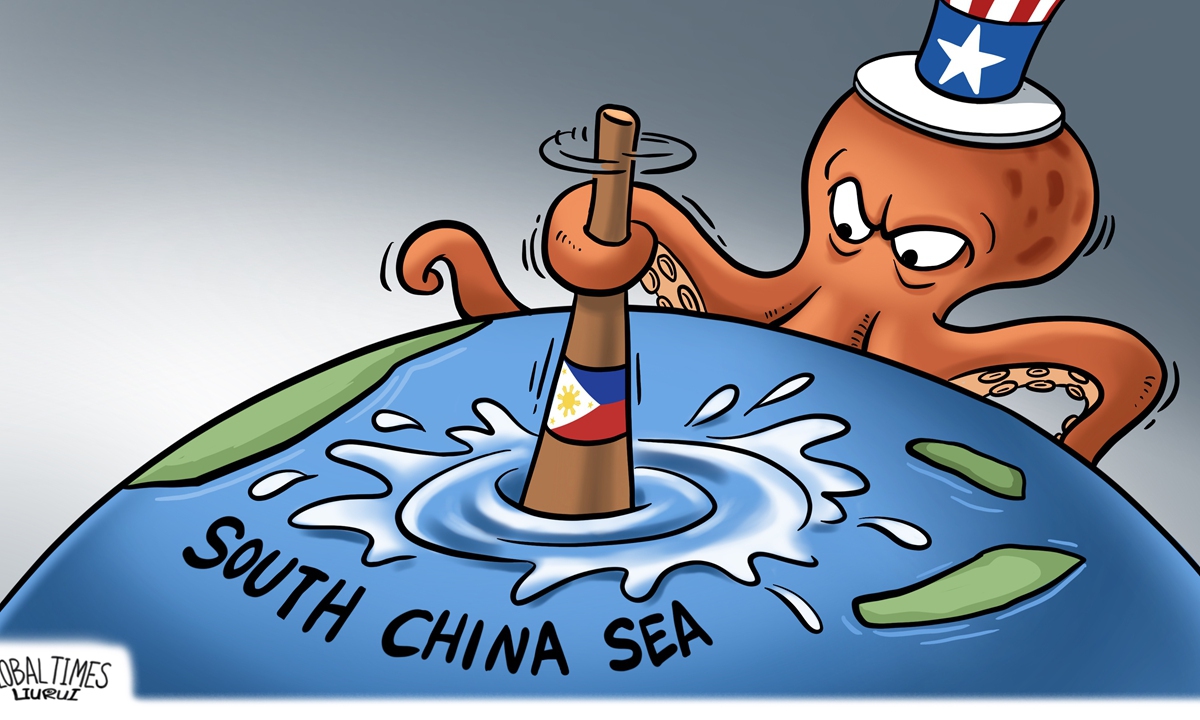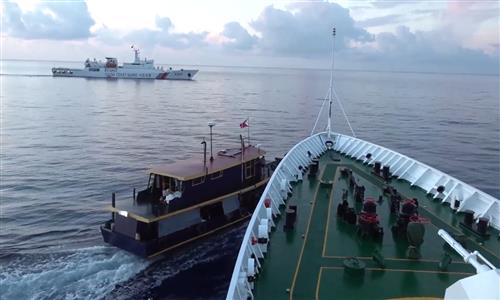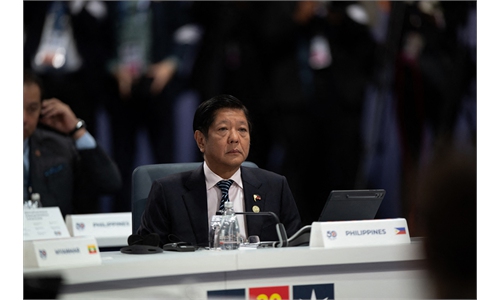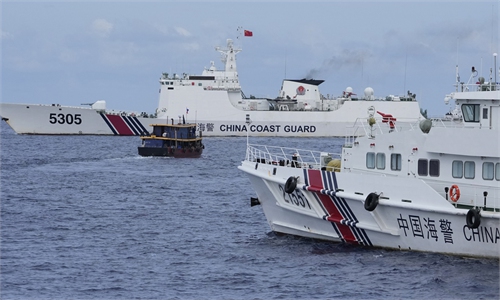Trilateral summit suggests Manila intensifying collusion with US, Japan to further complicate S.China Sea issues: expert

US in South China Sea Illustration:Liu Rui/GT
A trilateral summit between leaders of the Philippines, the US and Japan will reportedly be held in April amid rising tensions in the South China Sea. Analysts have warned that the Philippines' invitation to external forces to become more involved in the South China Sea could further heighten maritime risks and jeopardize regional stability.
The first three-way summit between Philippines President Ferdinand Marcos Jr, US President Joe Biden, and Japanese Prime Minister Fumio Kishida is under discussion, Japanese media cited government sources as saying on Wednesday. Kishida will visit Washington as a state guest and hold bilateral talks with Biden on April 10, and Marcos Jr will have a meeting with them on April 11.
Ahead of the leaders' summit in Washington, US Secretary of State Antony Blinken and Japan's Foreign Minister Yoko Kamikawa will visit Manila next week for talks focusing on bolstering defense and economic ties in the wake of increasing conflict in the South China Sea, according to media reports.
In response to reports that the three countries will discuss measures to deal with China's increasingly "hegemonic activities" in the East China Sea and South China Sea, Chinese Foreign Ministry spokesperson Wang Wenbin said at a press conference on Thursday that China's activities in those waters fully comply with domestic and international law and are beyond reproach.
In contrast, the US' coming from afar to China's doorstep to form cliques, show off its strength and make trouble is the real hegemonic activity, said Wang, stressing that China's determination to defend its legitimate rights and interests is unwavering, and its territorial sovereignty and maritime rights and interests are not to be violated.
Since Marcos Jr came into power, he has been busy dragging more countries into the South China Sea issue, said Chen Xiangmiao, director of the World Navy Research Center at the National Institute for South China Sea Studies, noting that the Philippines has accelerated bilateral and trilateral cooperation between the countries. The summit, once confirmed, signifies an enhancement of the regular cooperation mechanism between the three countries, which will facilitate future coordination in a range of fields from diplomacy to defense.
Chen told the Global Times that the trilateral summit in Washington may result in a series of agreements, including assisting the Philippines in upgrading its coast guard, increasing joint patrols and military exercises in the South China Sea, and enhancing intelligence sharing and military training. In return, the Philippines will provide long-term support to the US and Japan in maintaining and expanding their military presence in the South China Sea.
Some Chinese analysts warn that the increased cooperation among the three countries could escalate tensions in the South China Sea and destabilize the region.
Each country has its own strategic interests in strengthening cooperation with the Philippines: Japan seeks to break through historical barriers and the US aims to strengthen its presence in the region to counter China. The growing military cooperation could lead to a higher risk of maritime conflicts and accidents in the South China Sea, observers noted.
In December 2023, Japan and the Philippines agreed to expedite the finalization of the Reciprocal Access Agreement (RAA), which would streamline the process for deploying defense personnel, weapons, and ammunition between the two countries. Analysts criticized the agreement, saying it marks a significant step toward a "quasi-alliance" between Japan and the Philippines.
Chen noted that with the backing of the US and Japan, the Philippines may adopt a more assertive stance and potentially engage in provocations, particularly in disputed areas such as Ren'ai Jiao and Huangyan Dao (Huangyan Island). Additionally, increased joint military patrols by the US, Philippines, and Japan in the South China Sea could escalate tensions and raise the likelihood of maritime conflicts.
The expert said that Marcos Jr's efforts to portray himself as a strong leader may also backfire, as heightened tensions in the South China Sea do not address the Philippines' domestic economic challenges and could harm its trade relations with China.
Some analysts also caution that the US' support for the Philippines is not unconditional and could be withdrawn if it no longer serves American interests.
By aligning closely with the US, the Philippines risks compromising its independence and balanced diplomacy, which it has worked hard to achieve over the years, said Chen.



